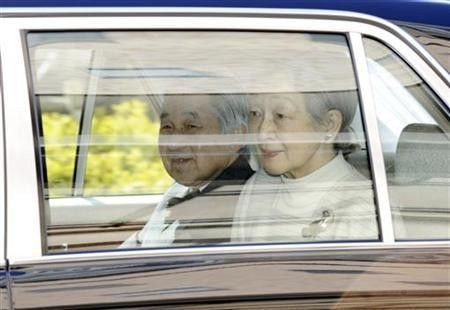Japanese Emperor Undergoes Successful Heart Bypass

Japan's Emperor Akihito underwent on Saturday a successful heart bypass operation and doctors said they hoped he would be able to resume the normal lifestyle he wished for.
Japanese Emperor Akihito (L) and Empress Michiko arrive at the entrance of the University of Tokyo Hospital in Tokyo February 17, 2012.
Akihito, 78, has been receiving treatment for heart problems for the past year and doctors decided last week that he needed a coronary bypass operation.
Akihito ascended to the throne after the death of his father, Hirohito, in 1989. He has spent much of the past two decades working to heal the wounds of a war waged across Asia in his father's name and helped bring the monarchy closer to ordinary citizens.
As far as operations go, it probably could not have proceeded any better, Minoru Ono, one of the doctors at the University of Tokyo Hospital who performed the four-hour operation, told reporters.
The doctors said they would keep a close watch on the emperor's conditions until he is deemed fit to leave hospital.
The operation's success will be measured by whether the emperor can regain the normal lifestyle he had wished for. We are looking forward to that day, but until then, we'll use the word success sparingly, said Juntendo University's Atsushi Amano, another surgeon who operated on the emperor.
Akihito checked into hospital on Friday and is expected to remain there for about two weeks for rehabilitation, they said.
Akihito had surgery for prostate cancer in 2003 and suffered stress-related health issues in late 2008. The following year, the royal agency said he would cut back on official duties such as speeches and meeting foreign dignitaries.
The latest surgery could prompt the royal agency to further limit the emperor's activities.
Considering the fact that the emperor will not be getting any younger, we will continue to review the amount of duties he performs, said Ichiro Kanazawa, the Imperial Household Agency's medical supervisor.
Save for rare occasions, the Japanese imperial family is spared the intense public attention or media scrutiny that Britain's royals get.
But it serves as a comforting link with tradition at times of distress.
Five days after a devastating earthquake and tsunami struck northeastern Japan on March 11, Akihito made a rare public televised address and in April travelled to the disaster area with Empress Michiko.
Akihito's hospital stay last year gave Japan a rare opportunity to see his heir Crown Prince Naruhito, 51, step in for his father and perform public duties.
While Akihito's reign was defined by his reconciliation efforts, it is less clear what role the scholarly Naruhito may play, though royal commentators expect him to continue his father's efforts to reach out to ordinary citizens.
© Copyright Thomson Reuters 2024. All rights reserved.





















